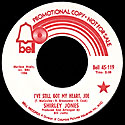
Must See TV: 1970!
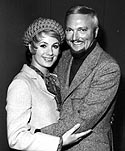
Shirley and Jack, early 1971
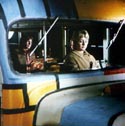
Shirley the teamster
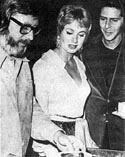
With Bob Claver and Wes Farrell
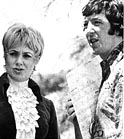
With series musical director, Brendan Cahill
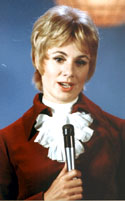
Shirley's lead work:
"I've Still Got My Heart, Joe"
Click to Play 'em!

With PF Make-up Supervisor, Mel Berns, Jr.
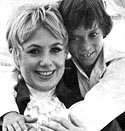
With Jeremy Gelbwaks
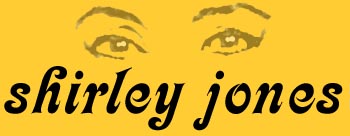
CONTINUED
GH: How
sure were you that the show was going to be a hit?
SJ: Well, I felt that way, but Iíve felt that way about
a lot of things that never happened!
GH: Was
Jack supportive of your switch from movies to television?
SJ: Oh, sure, he was very happy about it. For obvious
reasons. He was away in New York so much of the time doing Broadway. He
felt it was good for the kids too.
GH: Who
taught you do drive the bus?
SJ: It was a teamster. And it was an old bus. I mean,
it had the clutch and shift in the floor. I obviously learned to drive
on an automatic so I had no idea how to drive a clutch with the gearshift
in the floor. It was all new to me. I didnít have to do a lot of driving,
but it was nerve-wracking in the beginning. I would basically just put
it in gear and we would go.
GH: Was
that you driving along Hollywood Boulevard in the pilot?
SJ: Part of it was. I drove it mostly.
GH: A
busy intersection like that must have been incredibly nerve-wracking.
SJ: Oh sure. I had to drive it in and out. Now if they
shot it from the back, then it would have been somebody else. Thatís natural.
GH: How
was the music portion of the series originally presented to you, prior
to Wes Farrell and Davidís involvement? Were you ever supposed to be a
lead singer?
SJ: In the beginning nobody was sure what we were going
to do. They obviously knew I could sing, but they wanted to gear the show
and the music to the young people. In the beginning, it was just going
to be a chorus, basically, I guess. It all happened very quickly. When
they found out David could sing, they said. "Wait! Weíve got something
here!" I knew from the beginning that I wasnít supposed to front the band.
GH: Were
you supposed to participate on the records from the beginning too?
SJ: Yes, I was. I signed a record contract with them.
I knew I would be mostly in the background to David, because he was the
lead singer. But occasionally they would throw me a bone and I would get
something to sing.
GH: Some
people werenít too sure how that was all supposed to work in the beginning.
Did you ever record with the other background singers?
SJ: No, I always recorded separately.
GH: Who
did you work with in the recording studio?
SJ: Wes Farrell, and I think John Bahler was there as
well.
GH: How
often did you record?
SJ: Usually, we would do two or three shows at once, in
a session. Usually about 6 songs.
GH: When
did you record?
SJ: It would have to be on weekends or in the evenings
because I was filming all day.
GH: Do
you remember if you had the harmony or melody line to sing?
SJ: Iím not very good at harmony so Iím sure I had the
melody.
GH: Not
very good at harmony?
SJ: I donít read music! I have a good ear, fortunately,
but I donít read.
GH: There
was an attempt by Bell Records to release singles that you recorded for
the Adult Contemporary market. "Ainít Love Easy" and "Iíve Still Got My
Heart, Joe" are two of the titles. Do you know why that was scrapped?
SJ: I think they just decided that they wouldnít happen.
GH: Pop
music was a departure from the style of music that you were used to singing.
Was it a tough genre to get a grasp on?
SJ: Absolutely. I didnít know what they were talking about
for the most part. Iíd say, "Just put it in my terms." But mostly
it was just "oohs and aahs" in the background and be-bops and that kind
of stuff. Except for the stuff that I sang, like "The Whale Song", for
example.
GH: Many
fans are still mad that wasnít put on any Partridge Family record!
SJ: I know, I love that song!
GH: How
often would you have to go on press junkets to promote the series?
SJ: Usually once a year. We would do a lot more out here, but
as far as travelling around, they would do it once a year.
GH: How
often would you take publicity photos?
SJ: We had to do those at least twice a year.
GH: What
would a typical work week be like for you?
SJ: It took a full week to shoot the show. We would go
over the script and rehearse on Monday, and then shoot from Tuesday through
Friday.
GH: What
about your daily routine?
SJ: I would have to be in make-up anytime after 5:30 AM,
depending on my call. Then Iíd have to be on the set at 7:30 or 8:00AM
until lunch at 12:30PM. The children would finish their scenes first. Mine
were always the final shots of the day. Usually I was finished by 6:00
PM or so.
GH: During
the first season, you were the subject of a This Is Your Life. Were
you really surprised?
SJ: Very. I didnít know until Ralph Edwards came out.
When I saw him, I knew.
GH: What
do you remember about Jeremy Gelbwaks? Was he as troubled as recent interviews
suggest?
SJ: Yes, he had problems. I donít think he had done a
lot of acting and if he did, it was probably commercials and things like
that. I think he was accustomed to getting his own way and, when you are
an actor, youíve got to conform. That was the thing he found difficult.
Itís not that he couldnít have done it. He had an interesting little face
and he was charming off the set, but he just had trouble conforming to
what we had to do. So it was hard.
GH: Were
you surprised that he was replaced?
SJ: No.
GH: Was
his mother the stereotypical stage mother?
SJ: Yes, she was a stage mother.
